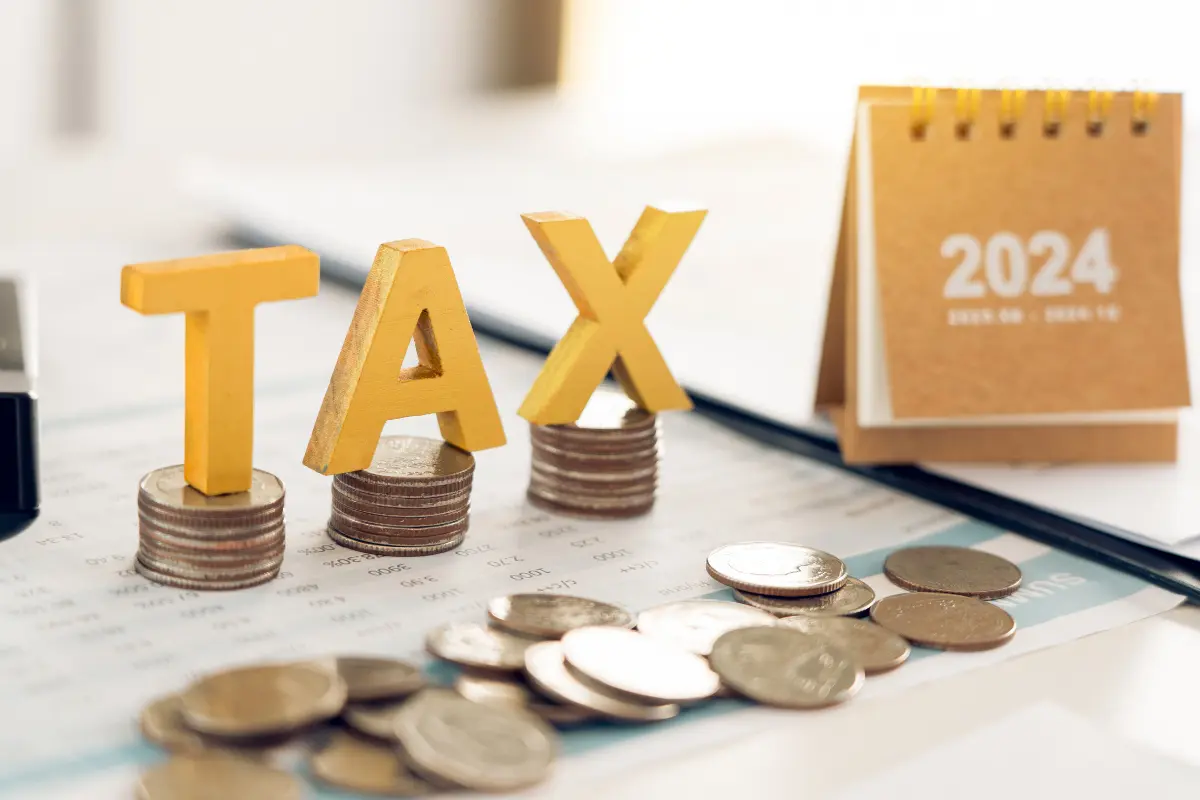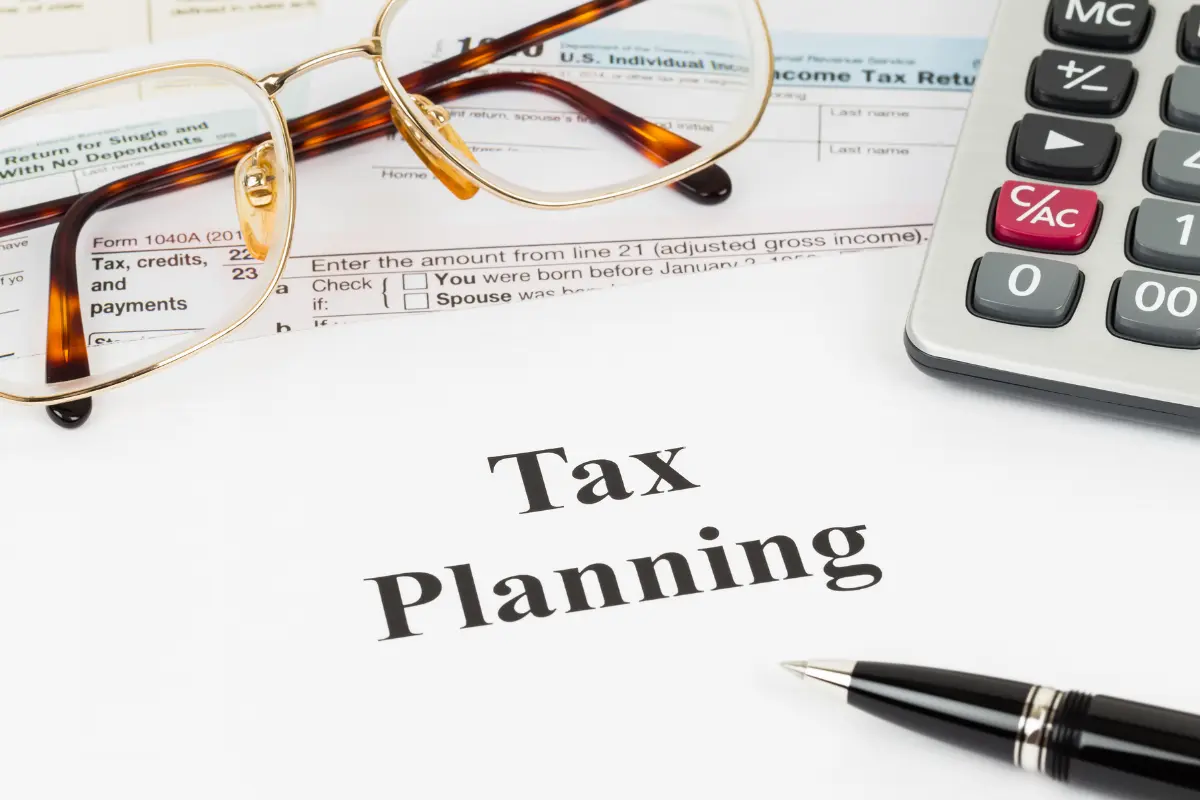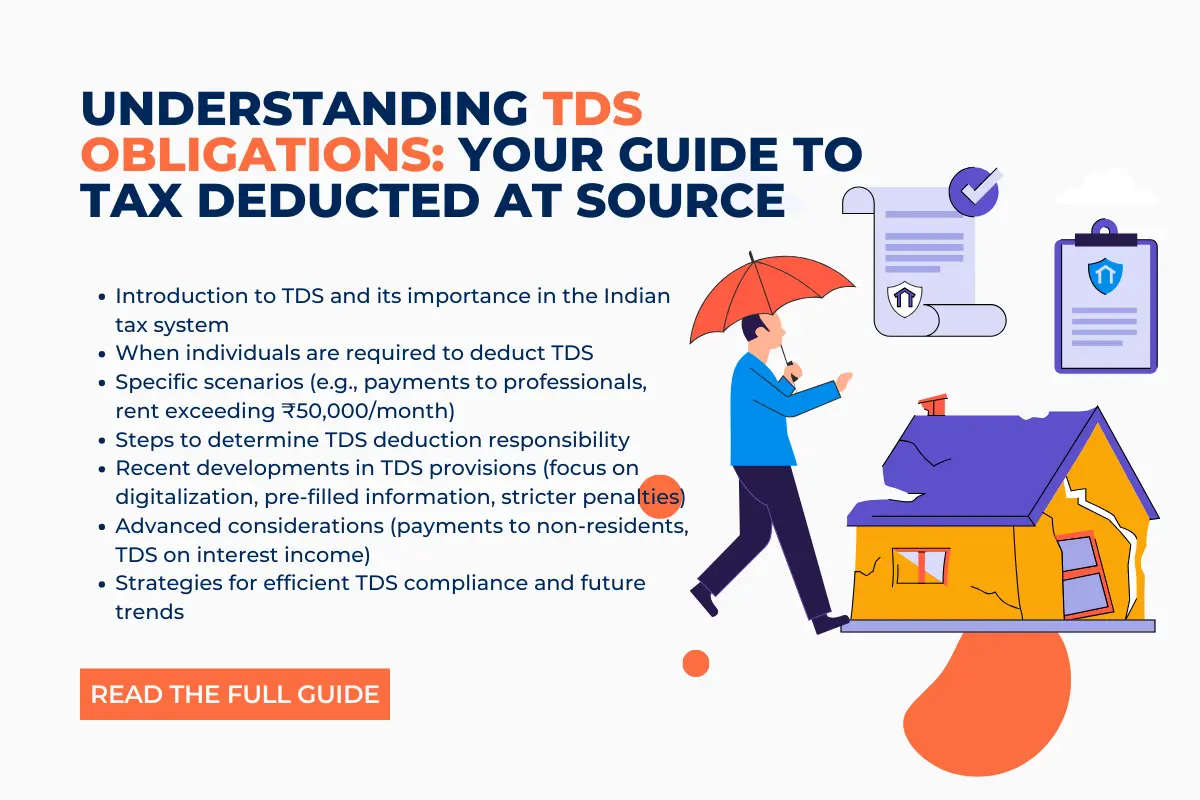A Guide for Determining Your Deduction Responsibility in India (2024 Update)
No. | Section | Description |
|---|---|---|
1 | Introduction deduct tds | Overview of TDS and its importance |
2 | Why Understanding TDS is Crucial | Consequences of failing to deduct TDS |
3 | When Does an Individual Need to Deduct TDS? | Common scenarios for TDS deduction by individuals |
4 | Steps to Determine Your TDS Deduction Responsibility | Step-by-step guide to identify your TDS obligation |
5 | Utilizing Online Resources | Information on resources available from the Income Tax Department |
6 | Recent Developments in TDS Provisions (as of June 2024) | Focus on digitalization, pre-filled TDS information, and stricter penalties |
7 | Beyond the Basics: Advanced Considerations for TDS by Individuals | Less common scenarios and claiming TDS deduction on tax return |
8 | Leveraging Technology for Efficient TDS Compliance | Utilizing online platforms and software solutions for TDS management |
9 | The Future of TDS: Emerging Trends and Strategies | Future trends like AI, Blockchain, and integration with accounting software |
10 | Strategies for Individuals to Navigate the Future of TDS | Actionable tips for individuals to stay compliant |
11 | Conclusion | Importance of understanding TDS for responsible tax compliance |
1. Introduction
The Indian tax system relies heavily on Tax Deducted at Source (TDS) to collect taxes at the source of income. This simplifies tax collection for the government and ensures a steady flow of revenue. But for individuals or businesses making payments, understanding their responsibility to deduct TDS can be a complex task. This blog dives deep into the world of TDS, specifically focusing on identifying situations where an individual is obligated to deduct TDS under the Income Tax Act, 1961.

2. Why Understanding TDS is Crucial
Failing to deduct TDS when mandated can lead to significant consequences for individuals:
- 2.1 Penalty: A penalty equal to 1% or 5% of the tax deductible (depending on the delay) can be imposed by the tax authorities.
- 2.2 Interest: Interest will be charged on the unpaid tax amount from the due date of TDS deduction till the date of payment.
- 2.3 Disallowance of Deduction: The individual may not be able to claim the TDS amount as a deduction on their own tax return.
Therefore, a clear understanding of TDS provisions and your obligation to deduct it is crucial for responsible tax compliance.
3. When Does an Individual Need to Deduct TDS?
Generally, individuals are not required to deduct TDS on payments they make in their personal capacity (e.g., groceries, rent for personal residence). However, there are specific situations where individuals acting as deductors (the payer) need to deduct TDS at source while making payments to the deductee (the recipient). Here’s a breakdown:
4. Payments to Specified Professionals
- 4.1 Individuals making payments exceeding ₹10,000 in a financial year to professionals or technicians (like doctors, lawyers, architects, consultants) for professional services rendered are required to deduct TDS at 10%.
- 4.2 This provision aims to ensure tax collection from professionals who may not always file tax returns promptly.

5. Rent Payments Exceeding ₹50,000 per Month
If you’re an individual paying rent for a property exceeding ₹50,000 per month, you might need to deduct TDS at 5% on the rent amount. However, an exemption applies if you have a rental agreement with the landlord and the landlord’s PAN details are mentioned. In such cases, the TDS liability shifts to the landlord, who must file their tax return accordingly.
6. Payments for Machinery or Plant Hire
- 6.1 Individuals making payments exceeding ₹50,000 in a financial year for hiring machinery or plant for business or professional purposes are required to deduct TDS at 5%.
Important Note: These are just some common scenarios. The Income Tax Act outlines various other situations where TDS deduction might be applicable for individuals. It’s advisable to consult a tax professional for specific guidance based on the nature of your payments.

7. Steps to Determine Your TDS Deduction Responsibility
Here is a step-by-step process to help you determine if you, as an individual, need to deduct TDS:
- 7.1
Identify the type of payment:
What type of payment are you making? Is it rent, a royalty or something else? - 7.2 Check the threshold amount:
Does the payment amount exceed the threshold specified for TDS deduction (e.g. ₹10,000 for professionals, ₹50,000 for rent)? - 7.3 Check the PAN data:
Does the deductor (beneficiary) have a valid PAN (Permanent Account Number)? TDS deduction is mandatory only if the deductor provides a PAN. - 7.4 View current TDS rates:
The applicable TDS rate may change from year to year. Keep yourself updated by reading the official government notifications or consulting a tax consultant.
8. Get professional help (if required):
If you’re unsure about your TDS obligations in a particular situation, it’s best to seek personalized advice from a qualified tax professional.
8.1 Use of online resources:
- The Income Tax Department’s website (https://www.incometax.gov.in/iec/foportal/) offers valuable resources for taxpayers, including TDS tables and calculators. You can use these tools to find out the applicable TDS rates and simplify your calculations.
Latest developments in TDS provisions (as on June 2024) 8.2 Focus on digitization:
- The Income Tax Department is actively promoting online platforms for TDS payments and preparation of tax notices. Individuals can deduct and deposit TDS electronically, ensuring transparency and efficient tax collection.
8.3 Pre-filled TDS information:
- Similar to the pre-filled income tax returns, the tax department is looking at pre-filling TDS information for payments made through online platforms. This initiative aims to reduce errors and simplify the TDS process for individuals.
8.4 Stricter penalties for non-compliance:
- The government is placing increasing emphasis on strict enforcement of TDS regulations. Penalties for non-compliance, such as failure to deduct TDS or late payment of tax deducted, could become more stringent in the future.
8.5 More than just the basics:
- Advanced considerations for TDS by individuals
While the above scenarios cover common situations, individuals may face more complex TDS scenarios: 8.6 Payments to non-residents:
- TDS provisions apply to payments made to non-residents for services rendered in India. The applicable TDS rate depends on the nature of the service, the tax residency status of the recipient and the existence of a Double Taxation Avoidance Agreement (DTAA) between India and the recipient’s country. It is strongly recommended to consult a tax professional for such payments.
8.7 TDS on interest income:
- Although not common for individuals, TDS can be levied on interest income from certain investments in certain situations. For example, TDS can be deducted on interest income from income bonds if they exceed a specific limit.
8.8 Claiming TDS deduction in your tax return:
- If you have deducted TDS on your payments, you can claim it as a deduction in your income tax return. Make sure you have the settlement certificates (proof of TDS deposit) for all these deductions.
Leveraging technology for efficient TDS compliance 8.9 Online TDS payment platforms:
- Use online platforms provided by authorized banks or Income Tax Department to deduct and deposit TDS electronically. These platforms provide convenience, security and real-time confirmation of TDS payments.
8.10 TDS software solutions:
- Consider using TDS software solutions to streamline the TDS process. These software programs can help in calculating TDS, creating deposit slips and managing records electronically, saving you time and effort.Keeping up to date with the latest TDS regulations and leveraging technology solutions can help you meet your TDS obligations efficiently and minimize the risk of penalties.
9. The future of TDS: new trends and strategies
The landscape of TDS compliance in India is constantly evolving, driven by technological advancements and an increasing emphasis on transparency. Below, we explore some emerging trends and strategies that will shape the future of TDS for individuals:
9.1 Artificial Intelligence (AI) for automated TDS compliance:
AI-powered solutions are being developed to automate TDS calculations, preparation of tax notices and even filing of tax returns. These tools can analyze payment data, identify TDS liabilities and suggest appropriate actions to simplify compliance for individuals.9.2 Blockchain technology for secure TDS transactions:
Blockchain technology holds immense potential for secure and transparent TDS transactions. Blockchain can create an immutable record of TDS deductions and payments, reducing the risk of errors and fraud. This can further simplify communication and collaboration between individuals, taxpayers and the tax authorities.9.3
Real-time TDS integration with accounting software:
Integration of TDS functions with popular accounting software programs is becoming more common. In this way, TDS can be seamlessly integrated into existing accounting workflows, reducing manual data entry and minimizing errors.9.4 Evolving regulatory landscape:
As technology and the tax system evolve, we can expect the government to introduce new regulations or amend existing regulations related to TDS. To ensure compliance, it’s important to stay abreast of these changes. The Income Tax Department website and advice from tax professionals are your main sources of information.
Strategies for individuals to manage the future of TDS
Below are some strategies that individuals can use to prepare for the future of TDS:9.5 Embrace the technology:
Be open to exploring and utilizing technological solutions such as AI-powered tools or integrated accounting software for TDS compliance. These tools can save time, reduce errors and make the process more efficient.9.6 Stay informed:
Make it a habit to keep yourself updated on changes in TDS regulations and best practices. Use resources such as the Income Tax Department’s website, advice from tax professionals and industry publications to stay informed.9.7 Develop a proactive approach:
Don’t wait till the last minute to deal with TDS obligations. Plan ahead, familiarize yourself with your obligations and maintain proper records of TDS deductions and settlement certificates. This proactive approach ensures timely compliance and minimizes potential problems.9.8 Get professional help:
For complex situations or large transactions, don’t hesitate to seek advice from a qualified tax professional. A tax professional can give you customized advice and ensure that you can effectively leverage the intricacies of TDS.
Understanding the evolving TDS landscape and applying these strategies can help you become a responsible and informed taxpayer. Remember, efficient TDS compliance not only benefits the government but also contributes to a more transparent and robust tax ecosystem in India.

